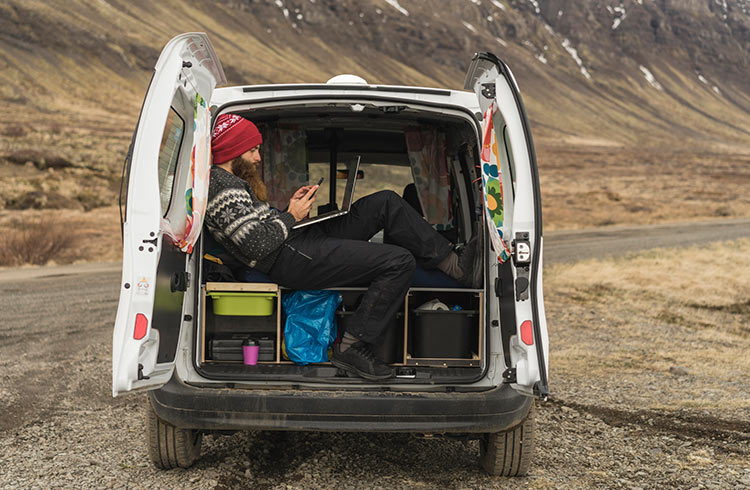Travel writers have an opportunity to influence the planet in positive ways, advises National Geographic's Norie Quintos.
 Photo © Getty Images / Volanthevist
Photo © Getty Images / Volanthevist
Admit it, fellow travel writers, you love it when someone tells you they were inspired by your words or followed your advice or planned a trip around a piece you wrote. You, like me, get a rush out of wielding that power, whether it’s to share where to eat in Washington, D.C. or to tell a tale of personal transformation that opens eyes, changes minds, and even melts hearts.
The pen (or its digital counterpart) is mighty, and whether we realize it or not, is a large part of why we write.
But with the planet in a climate crisis and travel and flying implicated as not-insignificant contributing factors, not to mention related issues such as over-tourism, biodiversity loss, and poverty, travel writers (and aspiring travel writers) can no longer leave it to news reporters and environment writers to do the dirty work. We need to not only travel responsibly but also write responsibly.
Obviously, writers can pen stories about how to get around sustainably and many do so admirably. But there’s a limited market for those kinds of stories in travel media, which in many cases has become an arm of travel marketing and promotion.
As one writer friend complained to me recently, “many outlets seem to have a limited appetite for stories about sustainability.” But just because you're not explicitly writing a responsible travel story doesn’t mean you are powerless. Here are six things you can do.
- Choose carefully
- See something, say something
- Give context to issues and challenges
- Model good behavior
- Kick the bucket list
- Get involved
Choose carefully
Remember that you are raising the profile of the companies and destinations you write about. So don’t just write about anybody. Whatever you’re writing about, decide to only cover companies and destinations that follow best practices. When I wrote about immersive Latin American tours last year, I not only filtered for interesting itineraries but also vetted the operators I mentioned for sustainability practices.
See something, say something
Better yet, share your concerns (respectfully) with travel providers. Is a local tour operator letting guests pet wild animals or handing out plastic water bottles in situations where they could be using filtered water? As a member of the travel media, you are in a better position than a regular traveler to take the manager aside and suggest alternatives.
Give context to issues and challenges
When writing about a place, along with the standard where-to-eat and what-to-do, be sure to work into your copy the challenges and issues of the destination, as well as potential solutions. Writing about the Galapagos? Don’t mention the lumbering land tortoises without also talking about the precariousness of their survival and that travelers can help by eliminating single-use plastics from their daily lives and 'adopting' an animal through the Galapagos Conservancy. Of course, that means you need to do adequate reporting before, during, and after your trip, and not just practice fly-in/fly-out travel journalism, right?
Model good behavior
On your owned content (social feeds, website, blog) you have more freedom to model best travel practices and even write that close-to-the-heart piece for which you can’t find a home.
Pay special attention to the pictures, which are perhaps the only thing more powerful than words. While I’m nowhere near perfect, on my own social feeds (@noriecicerone) I try to model the type of travel I believe can be a force for good.
What do your photos say without saying? I see too many images of so-called influencers cradling wild animals, sipping smoothies with plastic straws, and taking selfies with potentially vulnerable local children without context or explanation. Use your considerable influence to have a positive impact.
Kick the bucket list
Travel websites love round-ups and travel bucket lists, but these, along with Instagram travel selfies, have encouraged travelers to a damaging dash around the world, not to know it but to show you were there.
I can’t always avoid writing the ubiquitous listicle, especially when it’s with a plum outlet, but these days I assiduously avoid the overburdened icons to surface the out-of-the-way treasures that have the infrastructure and capacity to handle visitors (in Peru, for example, Kuelap rather than Machu Picchu).
Where I can, and in my personal travels, I slow it way down, settling in for stays of more than a month in Mexico City this year and in Quito in 2019, so that more of my money goes toward supporting the neighborhood economy: the corner mercado, the panadería down the street, the Spanish-language school, and, natch, the cafetería near the school.
Get involved
It’s time for each of us to accept that the travel media is part of the problem and decide what we’re going to do about it. Have I considered abandoning leisure travel completely? Not seriously; there are too many net positives of travel, including connecting cultures and opening new vistas.
Currently, there is no ideal solution; there are only various imperfect or incomplete options, including carbon offsetting your travels, going plastic-free, combining trips to reduce airplane travel, etc.
As mentioned, on my personal trips I am flying less often and staying longer in the destination. For work trips, I sometimes purchase carbon offsets but mostly focus on donating time and money as a board member of the Adventure Travel Conservation Fund, which supports wildlife and conservation projects around the world. And increasingly I write, speak, and consult on ways to transform the tourism industry to be less of a problem and more of a solution.
What is clear is that every member of the travel media – and everyone who aspires to be in this club – ought to do something, and not only that, ought to radically change the advice we give to those who read our stories, see our images, and follow our travels.
You have superpowers. How will you use them?
Related articles
Simple and flexible travel insurance
You can buy at home or while traveling, and claim online from anywhere in the world. With 150+ adventure activities covered and 24/7 emergency assistance.
Get a quote


No Comments